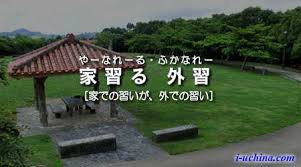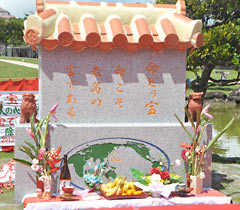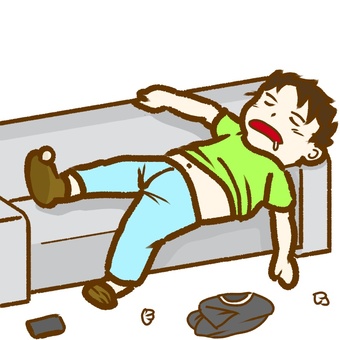Uchinaa Culture 08 - Kugani kutuba, the Golden Words Part1

Page contents
-
Introduction
-
Nuchi du takara (命どぅ宝) 'Life is the very thing we treasure'
-
Yaanareeru fukanaree (家習る外習) 'Your domestic habits are your public habits'
日本語版はこちら
Introduction
A good way to get a glimpse of a certain culture is probably looking at the culture through the language used by the people in the culture. For instance, we can learn a lot from proverbs and sayings, which have been passed down through the generations, about the people's perspectives of culture, nature, history, life, virtue, and so forth.
In Okinawa, there is a special category of words called 'Kugani kutuba (黄金言葉)'. The literal translation for this is 'Golden Words'. Kugani kutuba are more or less relevant to what people call 'proverbs' or 'teachings' in other cultures. These are deeply connected to the day-to-day life of common Okinawan people and they have been passed down from the older generations to the younger generations throughout the decades. Kugani kutuba have been developed based on the knowledge acquired from the ancestors' experiences to teach children things that are important for them to live better lives. We can feel the strong hope of our ancestors for future generations and are so grateful. You may have already heard of some of them. Some of them are a little harsh, some are empowering, and some are poetic. I hope you enjoy reading about some of them in this post.
Nuchi du takara (命どぅ宝) - 'Life is the very thing we treasure'
Let's start with a short one. This one is probably one of the most well-known Kugani kutuba amongst Okinawan people. It teaches us that 'life is what we have to treasure more than anything else we possess. If we lose it, we will never get it back'.
It is said that the expression originated from the line used in an Okinawan theatre play that was played in the early 1930s. The play was set in the late 1800s, where Shotai, the last king of the Ryukyuan kingdom, was forced to leave Okinawa for Tokyo after the kingdom's assimilation into the Japanese system. At the end of the play, the role who played king Shotai, closed the play with a poetic line saying 'The conflict will soon be over, and the world of Maitraya is soon to come, my vassals, do not weep, life is the very thing we treasure (Life is the source of everything, if we live on, good things will happen for sure.).'
This Kugani kutuba is said to have been spread rapidly amongst the locals after the battle of Okinawa. This is such precious teaching from the generations that experienced the war, hoping that future generations must never experience the same hardships they have been through. The Kugani kutuba is carved on a plaque in the Okinawa Peace Memorial Park (Picture1). The Kugani kutuba has been used for titles for some films and theatrical plays.
Below: Picture1 A plaque at the Peace Memorial Park with the Kugani kutuba 'Nuchi du takara'

Yaanareeru fukanaree (家習る外習) - 'Your domestic habits are your public habits'
This Kugani kutuba is what my mother used to say whenever she wanted me to change my bad habits at home. This Kugani kutuba teaches us that our bad habits at home will be revealed in front of the public even if we try hard to hide them. It tells us that even at home (i.e. when not being seen by others), we should behave in the way how we want ourselves to be perceived by other people. Otherwise, we will embarrass ourselves by unconsciously showing the sides we don't want others to see.

That's it for Kugani kutuba Part1. I plan to introduce more Kugani kutuba very soon! I hope you may be able to deepen your understanding of the local culture by discussing them with your Okinawan friends, asking them about their own perceptions about these words, or sharing your own perceptions about them!
This post was developed by Yoshimasa Nakamura (Resource Centre)
Photo credit:



